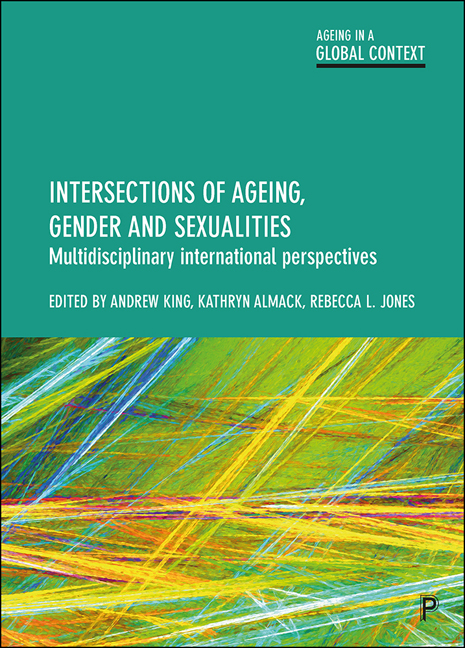four - Transgender ageing: community resistance and well-being in the life course
Published online by Cambridge University Press: 27 April 2022
Summary
Introduction
A small but growing field of social research is emerging on the topic of trans ageing. This scholarship is situated within the larger field of LGBTQ (lesbian, gay, bisexual, transgender and queer) ageing and highlights the challenges to health and well-being that many transgender adults experience as they age. In this chapter we will briefly summarise the empirical landscape concerning the well-being of transgender older adults, present the theoretical perspectives we are using, and then present insights from two social science projects carried out in Sweden and the US. We derive these insights by using queer and life-course perspectives on the intersections of age, gender and sexuality and conclude with a discussion of the meaning of well-being for transgender adults whose lives exist at these intersections.
Trans ageing: empirical landscape
The Trans MetLife Survey on Later-Life Preparedness and Perceptions in Transgender-Identified Individuals (TMLS) is the largest internationally distributed online survey to date of trans-identified people (N=1,963) that addresses how ageing affects perceived possibilities to live accordingly to one's gender identity (Witten, 2013). Respondents, who were majority white (92%), reported significant fears of becoming ill and being involuntarily outed and not receiving the care they will need at the end of their lives. Many respondents (who were not lesbian, gay and bisexual identified) also expressed worry that they would be ‘lumped together’ with lesbian, gay and bisexual (LGB) ageing services where they did not feel comfortable (Witten, 2009, 2013; Witten and Eyler, 2012). These experiences vary by age, sexual orientation, and gender identities (Witten, 2016), religious affiliation and spiritual practices (Porter et al., 2013), and experiences of family and community (Witten, 2009).
The Caring and Ageing with Pride project, a survey study in the US of 2,560 LGBT adult respondents aged 50 and older (159 of whom identified as transgender), also offers insights into the health and wellbeing of transgender older adults (Fredriksen-Goldsen et al., 2011). This study found that transgender older adults are at significantly higher risk of poor physical health, disability, depressive symptomatology and perceived stress in comparison to non-transgender LGB older adults (Fredriksen-Goldsen et al., 2013). Fear among participants to access health-care services, coupled with internalised stigma and victimisation, were significant mediators in the relationship between gender identity and health outcomes (Fredriksen-Goldsen et al., 2011; 2013).
- Type
- Chapter
- Information
- Intersections of Ageing, Gender and SexualitiesMultidisciplinary International Perspectives, pp. 47 - 62Publisher: Bristol University PressPrint publication year: 2019



